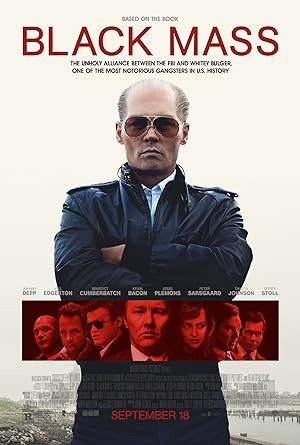Johnny Depp owes me money because I saw the trailer to Mortdecai. I actually watched Dark Shadows and Transcendence. The Lone Ranger should not even exist. Depp may be a great actor, but I’m tired of his particular brand of kookiness that seems less fresh and more like an ATM. So even though I knew that Depp returned to his acting glory in Black Mass, there was no way that I was going to see it in theaters.
Black Mass is framed as an interrogation of various accomplices of Whitey Bulger turned government witnesses as they tell the FBI, i.e. the audience, about their views of Bulger, how he became a crime boss and how the FBI became his lead enforcer. Black Mass assumes that we know the basics of the story so if you don’t, I would suggest that you watch a documentary like Whitey: United States of America v. James J. Bulger or wiki Bulger before seeing Black Mass. If you don’t, you are going to be confused at one particular scheme that takes place outside of Massachusetts and does not involve criminals.
Even though Bulger is the central figure around which all the action revolves, the real main character is Bulger’s childhood friend turned FBI agent, John Connolly, who is more loyal to Bulger than his wife or his employer. Connolly wants the respectability and position due to an FBI agent, but the camaraderie, glory and perks given to a gangster. Connolly’s soul is stuck in the childhood streets that he escaped from. Black Mass is essentially a Faustian story with Bulger as the devil.
Many scenes in Black Mass were more reminiscent of the Omen and The Devil’s Advocate than any gangster movie. I’m glad that Depp restrained his approach to Bulger because the visuals bombastically present him as some sort of anti-Christ/devil figure lurking in the shadows, the backs of churches and the edges of community during a St. Patrick Day parade with a veneer of bonhomie that can suddenly transform into violence. Black Mass briefly represents Bulger as a human being-a father, a significant other, a son, a brother, an Irish patriot, but these scenes are mostly chilling vignettes to show that he had a limited understanding of what a loving person looks like and suggests that his corrupting presence is like a poison that infects those who surround him. Bulger’s depiction is limited to exhibiting his “violent decisiveness at any hint of betrayal.” Even Bulger’s men are not immune from having to sacrifice those they love in order to appease their blood-thirsty god from turning on them.
[Side note: I think that an amazing filmmaker should tackle the idea that the height of Bulger’s power occurred at the same time as the government’s collaboration with the Catholic Church to cover-up child abuse. There is an overwhelming sense that pagan practices of human sacrifice never ended with the coming of Christianity, it simply took the veneer of Christianity and the subsequent ruling bureaucracy then resumed business as usual.]
Black Mass has an amazing cast. Joel Egerton, who plays John Connolly, has always done solid work even in less than outstanding movies. I love Benedict Cumberbatch, but did he NEED to play Billy Bulger. Did he? These British people are taking our jobs. Naturally he shows how difficult it is to be a loving brother who is trying not to get soiled by his brother’s schemes. Peter Sarsgaard appears briefly, but magnificently, as an accomplice turned Bulger victim. If I see poor David Harbour playing a cop, I know that he will end up corrupt. Kevin Bacon is perfect as the incredulous and frustrated FBI boss that knows he is being played, but can’t quite figure out how. Corey Stoll is effortless as a no nonsense hard ass. Julianne Nicholson is the only woman who appears throughout the majority of the film, and she solidly balances toughness and vulnerability in a challenging role as Connolly’s wife.
While Black Mass was a solidly executed movie, it made a mistake by not trying to explore Bulger as a human being since he is the reason that we are watching the movie. The most fascinating part of the Iceman documentaries is recognizing that he is a real human being albeit a horrifying one. I wanted to know how he became a living monster. If Black Mass had even explored a simple issue such as why Bulger didn’t ever bring his son to his brother’s house and establish more about the Bulger brother dynamic such as why Billy did not ask him to, then we would understand more about Bulger as something other than a mythic figure.
One could argue that those scenes are not germane to the investigation so they are not depicted. In that case, all the family scenes should not have been included, especially since Black Mass mistakenly has witnesses testify to something that the witness clearly did not see such as the Bulger brothers playing cards at their mother’s house. Other than Connolly, none of the characters really transform as the movie unfolds. The only momentum is the growth of Bulger’s empire, but that is meaningless since Bulger wears the same jacket and shows little joy in his accomplishment. The audience cannot emotionally relate to anyone in the story, including Connolly, since he is incidentally, not actually, the main character. Bulger is the same monster at the beginning as he is at the end of Black Mass so many people were probably bored by Black Mass and felt like everyone was just going through the motions. Black Mass is a solid movie, but not an enjoyable one.
Stay In The Know
Join my mailing list to get updates about recent reviews, upcoming speaking engagements, and film news.





